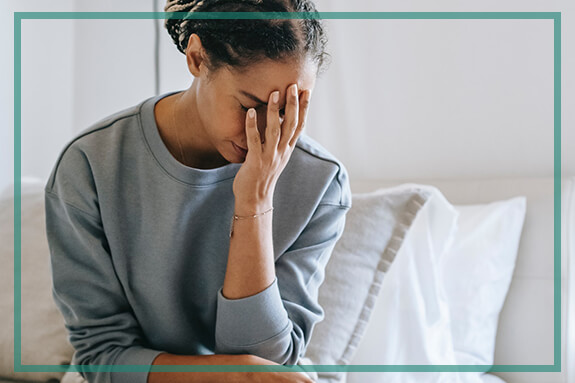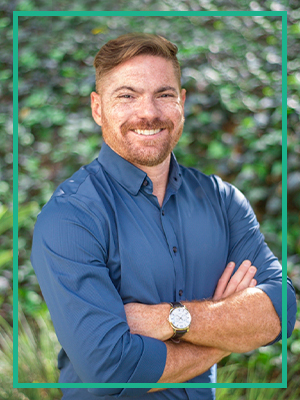Anxiety Treatment in San Diego, CA
Symptoms of anxiety can vary greatly from one person to another — we can help you find the relief you need.
What are symptoms of Anxiety?
Anxiety and stress can affect how you think, feel, and behave. Clinically elevated symptoms are often prolonged, cause significant levels of distress, and greatly impact your ability to function in your everyday life. Here are some examples of some of the different ways we may feel anxious.

Thoughts
Anxiety can lead to excessive worry and racing thoughts that can make it difficult for you to focus, concentrate, or remember important information.

Feelings
Anxiety can make you feel nervous, on-edge, overwhelmed, irritable, or restless. Moreover, it can make you feel like you’ve lost a sense of control over your life.

Behaviors
Anxiety can also impact your physical health and your ability to work, to take care of daily responsibilities, or to develop and maintain meaningful relationships with those around you.
What are the Causes of Anxiety?
Fear and anxiety are important to experience, because they often alert our brains and our bodies in ways that keep us safe. This reaction is often called the “fight-or-flight” response--which in the short-term can help us to cope with various acute stressors. However, many of the stressors we face today are more prolonged or less obviously dangerous, often forcing our minds and our bodies to maintain the “fight-or-flight” response for much longer periods of time.
Each person experiences stress differently, based on their experiences, values, resources, and abilities to cope. Understanding your unique stressors and their impact on your mental and physical health can play an important role in managing your anxiety.
For example, stressors can range from everyday hassles (e.g. paying bills or running late to work) to major life events (e.g. divorce or death). They can also be negative events (e.g. losing a job or being hospitalized) or even positive events (e.g. going on a trip or planning a wedding). Stress can also come from many different areas in our lives, including work, health, finances, friends/family, or environment. By assessing our sources of stress, we can empower ourselves to better manage our stressors.
Although we all experience stressors on a regular basis, if these stressors feel too overwhelming or you feel as though you are facing the same struggles time and again, it may be time to ask for help.

The Mind-Body Connection
Understanding the mind-body connection can play an important role in managing our anxiety, as it helps us understand both the psychological and physical impacts of stress and anxiety on our overall well-being. The mind-body connection refers to the paths that link our minds (e.g. our mental states) to our bodies (e.g. our physical manifestations of anxiety) and vice versa. For example, we may experience increased muscle tension, heart rate, sweating, etc. in times of stress, which can then contribute to anxious thoughts, that then further heighten our physical experience of stress or anxiety.

The mind-body connection on it’s own is an adaptive part of the human experience. Physical pain, for instance, tells us to pay more attention to our health, which may then prompt us to seek appropriate treatment, when necessary. For the most part, the mind-body connection is designed to keep us safe. However, when we are faced with chronic anxiety or trauma--our fight-or-flight response may go into overdrive, resulting in more serious long-term mental and physical health concerns.
The good news, however, is that by understanding these paths, we can implement a variety of different strategies to help better manage our stressors and their impact on our physical health. For example, relaxation exercises such as deep belly breathing, when practiced regularly, can be effective in managing the physiological symptoms of stress. Such exercises can help to evoke a feeling of physical calm which can then allow us to think more clearly to better assess and manage our stressors.
Not every relaxation strategy will work for every person--and no one strategy will be helpful in every situation. However, with some practice, these strategies may become helpful tools in managing symptoms of stress and anxiety. Working with a trained mental health professional can help you identify which strategies may work best for you. For more information about how psychotherapy can help you harness your mind-body connection to improve your ability to cope with anxiety, please contact us at 619-354-4027 or info@coronadopsych.com
Get Help With Anxiety Disorders in San Diego!
Constant worry and stress can overwhelm even the most resilient of us all! Fortunately, there are proven methods to treat anxiety and to help you regain control and feel confident in your ability to cope.
At Coronado Psych, we specialize in working with clients of all ages struggling with anxiety, depression, grief, stress, life transitions, health behavior changes, health-related psychological distress, and more.
A course of treatment at Coronado Psych begins with a comprehensive assessment to ensure that treatment plans are designed to meet your unique needs. Although it can feel overwhelming at first, it is an important first step to finding relief and support.
Our expert therapists are still accepting new clients--and we invite you to schedule an initial consultation to learn more about our services.

Our Clinicians Who Can Help

Dr. Rika Tanaka
Founder/Licensed Clinical Psychologist
License #: PSY30925
Specialties: Anxiety, Depression, Chronic Illnesses, Life Transitions

Dr. Ryan Halquist
Licensed Clinical Psychologist
License #: PSY27221
Specialties: LGBTQ+ Life Experiences, Substance Abuse or Use

Dr. Sarah Tuberman-Green
Licensed Clinical Psychologist
License #: PSY32685
Specialties: Children, Adolescents, and Family

Dr. William Taboas, Ph.D.
Licensed Clinical Psychologist
License #: PSY32182
Specialties: Adult Anxiety, Mood Disorders
Learn More
If you would like more information about our services or fees, please contact us by phone (619-554-0120), email (info@coronadopsych.com) or schedule an initial complimentary consultation.
